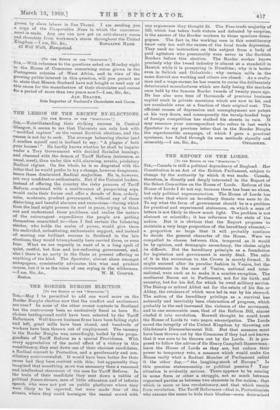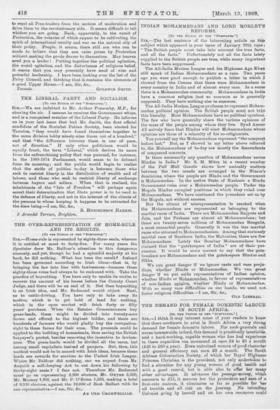THE REPORT ON THE LORDS.
[To TUN EDITOTt OF THII "SPEOTATOR.".1 SIR,—Canada is atilt a political dependency of England. Her Constitution is an Act of the British Parliament, subject to change by the authority by which it was made. Canada, therefore, is directly and deeply interested in the Report of the Select Committee on the House of Lords. Reform of the House of Lords I do not say, because there has been no abuse, but only political superannuation. The House of Lords has only done that which an hereditary Senate was sure to do. To say what the form of government should be is a problem for practical and experienced statesmen, on which a man of letters is not likely to throw much light. The problem is not abstract or scientific ; it has reference to the state of the nation. But it is obvious that the Report proposes to maintain a very large proportion of the hereditary element,— a proportion so large that it will probably continue to decide the general character of the House. Were we compelled to choose between this, tempered as it would be by opinion, and demagogic ascendency, the choice, might be difficult. But the hereditary principle as a, foundation for legislation and government is surely dead. The relic of it in the succession to the Crown is merely formal.. It might succeed after its peculiar fashion in Venice, but the circumstances in the ease of Venice, national and inter- national, were such as to make it a sombre exception. The mediaeval Baron sat in Parliament, not for his birth. and ancestry, but for his fief, for which he owed military service, The Bishop or mitred Abbot sat for the estate of his See. or Abbey, the retainers of which were led in war by his steward. The action of the hereditary privilege as . a survival hos naturally and inevitably been obstruction of progress, which probably in the end increased the violence of the movement, and in one memorable case, that of the Reform Bill, almost chafed it into revolution. Boswell thought he could trust the House of Lords to veto negro emancipation. The Lords saved the integrity of the United Kingdom by throwing out Gladstone's Dismemberment Bill. But that measure must have been thrown out by the Commons if they had not known that it was some to be thrown out by the Lords. It is pro- posed to follow the advice of Sir Henry Campbell-Bannerman : leave the House of Lords as they are, but reduce their power to temporary veto, a measure which would make the House really what a Radical Member of Parliament called it the other clay,—" the laughing-stock of Europe." Is this genuine statesmanship or political passion ? Your situation is evidently serious. There appears to be coining in some form or .other a struggle, not so much between organised parties as between two elements in the nation: that which is more or less revolutionary, and that which recoils from revolution. The Tariff Reforniers--that is, Protectionists who assume the name to hide their blushes—seem determined
to repel all Free-traders from the section of moderation and drive them to the revolutionary side. It seems difficult to tell whither you are going. Back, apparently, to the vomit of Protection, the votaries of which appear to be cultivating the spirit of international enmity and war as the natural ally of their polity. People, it seems, there still are who can be made to believe that they can raise prices by Protection without making the goods dearer to themselves. May heaven send you a leader I Putting together the political agitation, the social agitation, and the disturbance of religious belief, it seems that you may presently have need of wise and powerful leadership. I have been looking over the list of the Privy Council, and thinking that it contains the elements of a good Upper House.—I am, Sir, &c.,







































 Previous page
Previous page